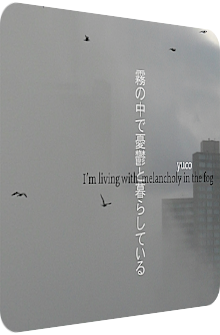
Yuco
I'm Living With
Melancholy In The Fog
2013
The latest album of the Japanese duo Masayoshi Miyazaki and Hiroshi Kobayash, known since 2008 as Yuco, harbors a very grave and heart-breaking topic in its epicenter, which is then presented in an entirely unexpected way. I'm Living With Melancholy In The Fog (also known as I'm Living In Melancholy In The Fog due to a translational equivocation regarding its original Japanese title) is a work of eight tracks, released in February 2013 on Kate Carr's Sydney-based Flaming Pines label, and chock-full of Miyazaki's piano chords, guitar drones and even sitar twangs in one instance. All instrumental layers are rounded off and expanded in their meaning by Kobayash's field recordings. The album's thematic nucleus evolves around the horrible tsunami that hit large parts of Japan in 2011. As the involved musicians reveal in the press sheet, Miyazaki was in a safe distance in China when the wave hit the island, but Kobayash was and still resides in the Tokyoite surroundings, watching the catastrophe from a somewhat closer observatory. This particular aftermath and the long mourning period are themes which are hard to assimilate. This is definitely not a lofty Ambient album, although works of post-apocalyptic notions and themes like this have been presented before, but the duo's twist certainly has not: despite the stylistic triptych of the foggy front artwork, the album's bold title and the back story, the featured minimalism and warm textures are surprisingly catchy, with many of the strong melodies composed in major! A foggy aura is only rarely perceptible or in place, crestfallen motifs or melodramatic timbres are almost entirely neglected. How does this fit with Yuco's objective? Do listeners with differing cultural backgrounds perceive the album in alternative or even counterintuitive ways? I will target and strive such questions over the course of this review while I dissect each of the eight original tracks in greater detail. Please note that Kate Carr gave me access to the digital version of Yuco's album, and this is the one I am generously using for this piece.
If you question the darker undertones and spine-tingling outlook the album injects, take a look at the track titles. The opener gives away a lot in this regard: I Broke Up Her Marriage may be a gruesome title, but the ensuing mélange of bright piano chords and only genteel scents of nostalgia and yearning make it a surprisingly glowing piece. Admixed airplane engines and coalescing layers of the piano's reverb augment the wideness of the arrangement. This tune succeeds due to its glaring Pop fundament, for the tone sequences are accessible, reoccurring and distinct. Did the tsunami or its months-long aftermath break up the marriage? Questions like these arise throughout the album. It is Another Death, Another Life which opens the intrinsic structure with aqueous clicks and blebs, dog-accentuated playground field recordings and golden-shimmering staccato piano aortas which are much more loaded with hope and confidence than despair or gloom. The rhythmic notes even outshine the actual lead melody at times, and it is their sparkling esprit which lessens the bleak leitmotif. The fog of the front artwork is nowhere to be found. The following Don't Say A Word is the first truly impressive tune, for it is tremendously bright and snugly, but higher volume levels unravel – otherwise hidden – uneasy strata of discomfort. Miyazaki's warm bonfire guitar scintillae are amicable and outright enchanting in adjacency to the wind gust-perturbed field recording of ocean waves, but it is the prelude that is enormously eerie and blurry: a mélange of monotonously droning synth strings underpins the warmhearted guitarscape and muffled beach scene, although these strings are frosty, tense and imply a pressure or power that is potentially able to crush the warmth. This is not exactly what happens, but the result comprises of dissonances and highly incompatible layers that cannot be meshed together, no matter how hard the duo tries. This clear cut antipathy is, I believe, the message and tells a better story or current state of affairs than any witty naming convention could ever accomplish to. This one is deeply impressive and thought-provoking, for the synth strings and the guitar belong together and cannot get rid of each other. Once the guitar melody ends, the grafted strings immediately cease to exist as well.
Minphea turns out to be the most fragile track, which is yet another surprise in the given context of the ubiquitous, immediate field recordings of screeching doors, aquatic droplets and the distant chirps of birds. There is anything else in this track but these field recordings and sun-lit acoustic guitar twangs, and once the latter are mute, the plasticity of the field recording coats the silence with streams of pink noise, plinking coins and other strange but ultimately soothing effects. Up next is I Bought Broken Modern Classical Records, probably the most minimal but strongly mollifying piece. A bubbling stream of water gurgles in close proximity to an indecisive eight-note guitar melody which fittingly meanders along the river, and while it changes to a two-note scheme in the middle of the track, it manages to return to its old form. Masayoshi Miyazaki and Hiroshi Kobayash decide to create a deliberately easygoing afternoon mystique. They are capable of complexer melodies, but this dreamscape is solely about the textures and the interplay of sound, sustain and silence. The guitar sounds fantastic, the coruscating field recording inherits a pristine purity despite its seemingly commonplace depiction of a runlet. I could listen to this ambience for hours. Wealth through minimalism. A Japanese artform.
Municipal Area is built on a similarly refreshing creek whose streaming power and cavernous hall effect are eminently stronger and livelier. The whole composition proves to be a counterpoint to the duo's lethargic bliss, if such an oxymoronic description makes any sense at all. The presented main melody resembles the vigor of the water; the duo connects electric piano spirals with classic piano cascades and constructs a luring, fairy tale-evoking meaningful prospect of both seriousness and that Japanese friskiness, making the heavily upwards flowing and downwards ebbing curvaceous tone sequence dichotomous. Loaded with anticlimactic implications, this piece depends strongly on the listener's background and his or her actual mood. Municipal Area slips through every try of interpretational sovereignty and leads to the epic centerpiece of more than seven minutes called A Complete Failure which takes the listener on a wild ride. True, you have read a sentence like this over a thousand times, but as formulaic as it may seem, it is used by me to actually describe the creative aloofness and vim of Yuco's arrangement. It launches with a foggy (!) whitewashed tape hiss, and as soon as Miyazaki's sitar is unleashed and ennobled by Space-Age laser pulses, galactic flecks and enigmatic goblet drums, the stylistic boundaries of the album are thunderously torn apart! The sizzling-hot Orient awaits those who dare to take a concentrated listen, and in the given exotic context, the track title can only be meant as a joke or cheeky tomfoolery. The color palette ranges from a dusky sunset-red glow to a nocturnal blue-tinged level of affection. This one has to be heard to be believed, as I tend to say when I lack the right – or even wrong – words. Does the title A Complete Failure live up to its name? Suuure, in some distant universe out there. The outro Dream Time Away (Introduction) can only underwhelm after such a fulminant out-of-body critter and masterpiece, but since Yuco change the surfaces once again by placing oscillating electric guitar drones of the murky Shoegaze kind next to contemplative temple drum loops and let this particular setting impart throughout the song – with only a plucked acoustic guitar added at the beginning and the end –, the duo makes this closing track a hypnotizing, similarly warming one.
The Flaming Pine label's press sheet notes that "throughout the album melodies build and then falter" – I strongly agree with the first assertion, but tend to look more critically towards the second part. Sure enough, if Yuco's tone sequences were only rising and growing ad infinitum, a specific song would never end, let alone the album itself. But the faltering aspect is not as bold and adamant as the grave subject or the history of the album suggest. While I'm Living With Melancholy In The Fog relies as much on the interpretative efforts and genuine dedication of the listener as virtually every other carefully crafted album with an overarching topic, it seems to demand much more. I cannot give you scientific evidence, only a personal insight: if I did neither know about the Japanese group's aesthetic reason to produce this album, nor the front cover and the album title, I couldn't possibly link these eight compositions and loop-based arrangements to devastation, destruction and desparation. The traces of euphoria, the minor slivers of rapture and contentment are advected into each strummed guitar chord. The silver-colored cleanliness of the gurgling water sources seem entirely intimate and innocent, the minimalistic melodies are purposefully humble yet meaningful, and the intimidating spell-breaking crescendo of the last two tracks is still a fitting conclusion to an immaculately japanized panorama. Alas, this work is linked to the tsunami and its gruesome aftermath, so all these vignettes – the laughing children for instance – could either be linked to the unawareness of the striking disaster in unaffected places or, hopefully, the signs of a new beginning. That the omnipresence of water in its different powerful states is no accidental misjudgment, but ubiquitously promoted and featured in every track is all the more bewildering in the given context. This stylistic cleft is unsolvable to me as a listener who is at home in Occidental realms. An album title such as I'm Living With Melancholy In The Water would be tremendously more macabre due to the evocation of the tsunami waves, but easier to link to the flows and streams that are as important for the aura of a track as the guitar layers and piano melodies. Yuco's album fits perfectly into the grand theme of Flaming Pines and is an excitingly good-natured Modern Classical artifact. After such a horrible incident, joy and vitality are needed. Yuco's latest work delivers these almost exclusively, as unbelievable as this may seem.
Further listening and reading:
- You can purchase and listen to Yuco's album at Bandcamp.
- More information about Yuco and their way of approaching their compositions is available on the Flaming Pines website.
- Follow Yuco on Twitter: @yuco_name.
Ambient Review 185: Yuco – I'm Living With Melancholy In The Fog (2013). Originally published on Feb. 20, 2013 at AmbientExotica.com.
